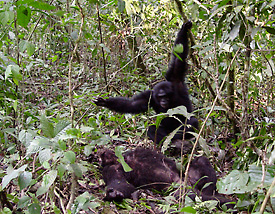Bands of chimpanzees violently kill individuals from neighboring groups in order to expand their own territory, according to a 10-year study of a chimp community in Uganda that provides the first definitive evidence for this long-suspected function of this behavior.
U-M primate behavioral ecologist John Mitani’s findings are published in the June 22 issue of Current Biology. Mitani is the James N. Spuhler Collegiate Professor in the Department of Anthropology. His co-authors are David Watts, an anthropology professor at Yale University, and Sylvia Amsler, a lecturer in anthropology at the University of Arkansas at Little Rock. Amsler worked on this project as a graduate student at U-M.

A young adult male chimp, who participated in a lethal attack, leaps on the body of the victim. Photo by John Mitani.
During their decade of study, the researchers witnessed 18 fatal attacks and found signs of three others perpetrated by members of a large community of about 150 chimps at Ngogo, Kibale National Park.
Then, in the summer of 2009, the Ngogo chimpanzees began to use the area where two-thirds of these events occurred, expanding their territory by 22 percent. They traveled, socialized and fed on their favorite fruits in the new region.
“When they started to move into this area, it didn’t take much time to realize that they had killed a lot of other chimpanzees there,” Mitani says. “Our observations help to resolve long-standing questions about the function of lethal intergroup aggression in chimpanzees.”
Chimpanzees (along with bonobos) are humans’ closest living relatives. Anthropologists have long known that they kill their neighbors, and they suspected that they did so to seize their land.
“Although some previous observations appear to support that hypothesis, until now, we have lacked clear-cut evidence,” Mitani says.
The bouts occurred when the primates were on routine, stealth “boundary patrols” into neighboring territory. In most of the attacks in this study, chimpanzee infants were killed. Mitani believes this might be because infants are easier targets than adult chimpanzees.
Scientists are still not sure if the chimpanzees’ ultimate motive is resources or mates. They haven’t ruled out the possibility that the attacks could attract new females to the Ngogo community.
Mitani says these findings disprove suggestions that the aggression is due to human intervention. Lethal attacks were first described by renowned primatologist Jane Goodall who, along with other human observers, used food to gain the chimps’ trust. Some researchers posited that feeding the animals might have affected their behavior. The Michigan researchers didn’t use food.
Mitani cautions against drawing any connections to human warfare and suggests instead that the findings could speak to the origins of teamwork.
“Warfare in the human sense occurs for lots of different reasons,” he says. “I’m just not convinced we’re talking about the same thing.
The paper is titled “Lethal intergroup aggression leads to territorial expansion in wild chimpanzees.”

